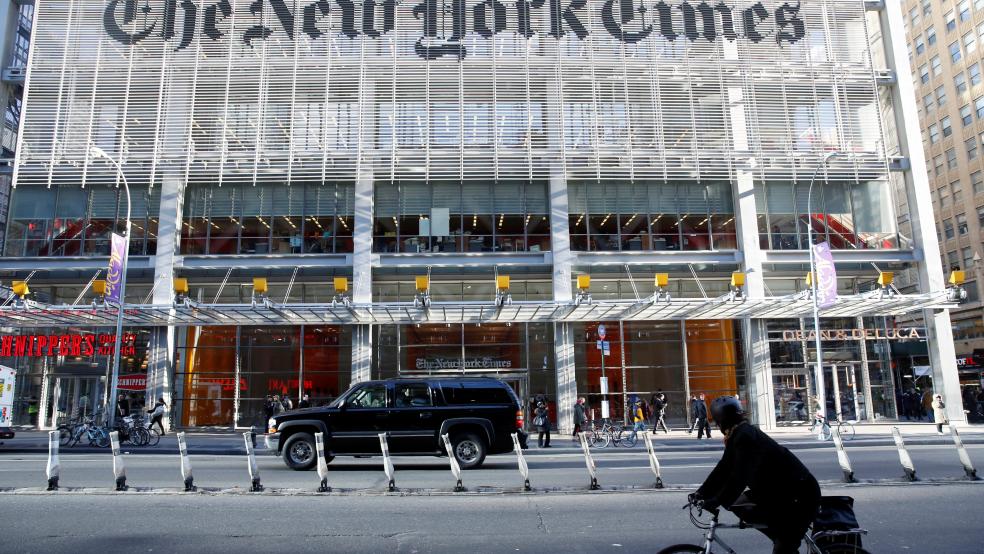Donald Trump’s Guerilla War Against the Liberal Media

by Liz Peek
Donald Trump has declared war on the liberal media and there’s nothing they can do about it. To the delight of millions of Americans, he has scolded them for their bias and mocked their hypocrisy. Best of all, he is showing just how unimportant they will be to his presidency.
Despite a soaring stock market, rising consumer confidence and other indications that the nation is optimistic about the Trump presidency, the liberal press continues to wallow in gloom. To retake the narrative, Trump has just announced he will take a “Victory Tour” to several states where he upset Hillary Clinton, staging the kinds of massive rallies that boosted his campaign. It is a brilliant move. News organizations will have to cover these events, and the sheer exuberance of the crowds will reinvigorate his followers and drown out those protesting his election.
That’s not his only line of attack. On Thanksgiving eve, Trump delivered a message urging unity and promising “a great national campaign to rebuild our country and to restore the full promise of America for all of our people." He did not appear on ABC News or sit down with Charlie Rose. Instead, he spoke to the nation via a video on YouTube, Trump’s version of FDR’s Fireside Chat. This wasn’t the first time he drew viewers to YouTube -- the new approach was inaugurated a few days earlier with an update on the efforts of his transition team.
Naturally, the political press saw nothing to like in these YouTube efforts – either in his remarks, or his manner of delivering them. The New York Times described the president-elect’s earlier recording as an “infomercial-style video” and sniffed that the outreach was supplanting a more conventional appearance saying, “The president-elect has declined to hold a news conference since his victory.” Why would he bother? Trump knows what kinds of questions he’ll get – inevitable queries about Nazi salutes or tearful, frightened immigrants – and he knows how his answers will be spun.
The public doesn’t care if he observes press conventions. Just as Rotten Tomatoes is rendering “film” critics obsolete for the millions of Americans who think their peers a better source for movie reviews, many welcome Trump’s direct approach. Tuning into YouTube could become the norm for those interested in hearing from their president-elect. Not only will they enjoy his messages, they will also enjoy the diminished power of the liberal media.
According to Gallup, the public’s trust and confidence in the media to “report the news accurately and fairly” has plummeted to an all-time low. In June a survey showed that only 8 percent of Americans had “a great deal” of confidence in our TV news channels and newspapers. By comparison, 25 percent and 41 percent have that level of esteem for the police and our military, respectively.
People in news organizations dispute that they have treated Trump unfairly, noting that he was given enormous free press during the GOP primaries, helping to pave his path to victory. That is true, but they did not give him free air time to be generous; Trump drove ratings for an industry desperate for readers and viewers. Moreover, he made himself available at all hours of the day and night, for outlets large and small – he never said no. The minute he became the nominee – this candidate that they had mocked and underestimated – the knives came out.
Trump is setting new ground rules, producing the kind of disruption to the status quo urged by his backers. Media operations will retaliate by slanting coverage of the president-elect but, let’s face it, they’ve already hit them with their worst. Another scathing piece from the New Yorker or CNN has about as much punch as watered-down ginger ale.
Recently Trump headed over to The New York Times to patch up their relationship and said, “I have great respect for The Times, and I’d like to turn it around.” He was courteous and respectful, and to their probable dismay, reasonable. He largely stood his ground; when pressed on favored topics like climate change, he said he had an open mind. When his aide Steve Bannon took a drubbing, Trump defended him. To his enormous credit, only once or twice did he bristle in that room full of hostility.
He tried. But any hopes that The Times will grant him fair coverage dissipated immediately. Day after day the scorching, biased articles continue to dominate the front page. The Times has been warned. There is no law that says a Timesreporter must be seated in the White House press briefing room. (For that matter, there is no law saying there must be a White House briefing room.) Trump will be entirely justified if he limits the paper’s access, and it will hurt his popularity not one iota. One of the most winning moments of George W. Bush’s 2000 campaign came when he called New York Times reporter Adam Clymer a “major league asshole.” Some things never change.
From the beginning, Trump has understood the power of appealing directly to the people. He has used (or over-used, depending on your perspective) Twitter with great success. Trump has 15.7 million followers on Twitter; President Obama has only 12.1 million. That’s a lot of folks ready to listen to what The Donald has to say. Why should he allow his every remark to be filtered through the hate-darkened lens of the New York Times or CNN?
In the next several years, Trump will make plenty of mistakes, and, like all leaders, should be held accountable. Perhaps his efforts to sideline the media will convince them to act as neutral observers, and not partisan players. Maybe he will Make the Media Great Again. I’m not holding my breath.
No comments:
Post a Comment